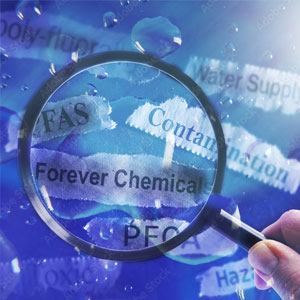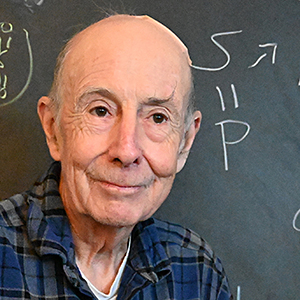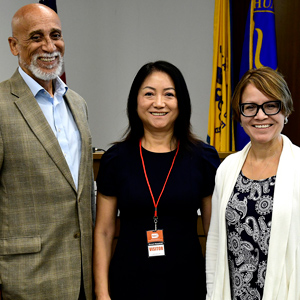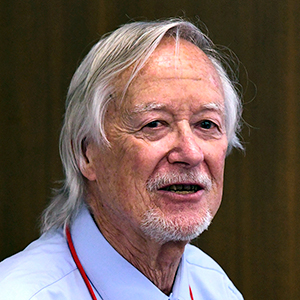Bacteria in the human gut cooperate with human cells to make a molecule essential for life, according to a team led by NIEHS scientists. The molecule, nicotinamide adenine dinucleotide (NAD), is required for the hundreds of biochemical reactions a cell must complete to survive.
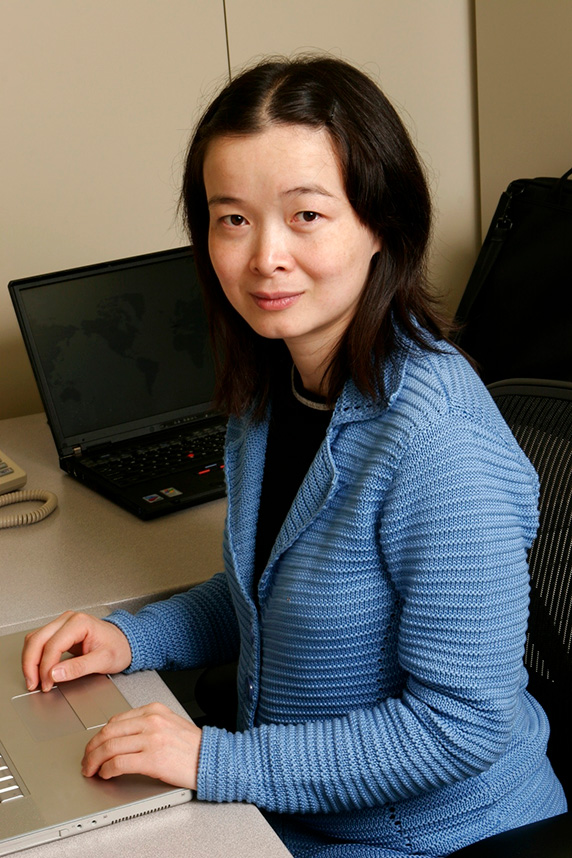 Li joined NIEHS in 2007 and was granted tenure by the National Institutes of Health in 2015. (Photo courtesy of Steve McCaw)
Li joined NIEHS in 2007 and was granted tenure by the National Institutes of Health in 2015. (Photo courtesy of Steve McCaw)The researchers also found that bacteria inside of some tumors protected the tumors from anti-cancer drugs that target NAD. The findings were published online Mar. 3 in Cell Metabolism.
NAD production
Xiaoling Li, Ph.D., head of the NIEHS Metabolism, Genes, and Environment Group, studies how NAD is produced through two biological pathways. One is called the amidated pathway and the other is a slightly longer series of reactions called the deamidated pathway.
Most scientists say that the two routes are separate in mammalian cells. The amidated pathway makes most of the NAD, and the deamidated one is seldom used. However, Li’s study suggests that gut bacteria make an enzyme called nicotinamidase (PncA) that allows both pathways to operate and produce NAD in mammalian cells.
She and her colleagues made the discovery by comparing NAD production in regular mice with that in mice lacking microbes in their gut, or gut microbiota.
'Based on our previous knowledge about mammalian NAD production, no one has ever thought that bacteria could be significantly contributing to it,' Li said.
Allowing tumors to grow
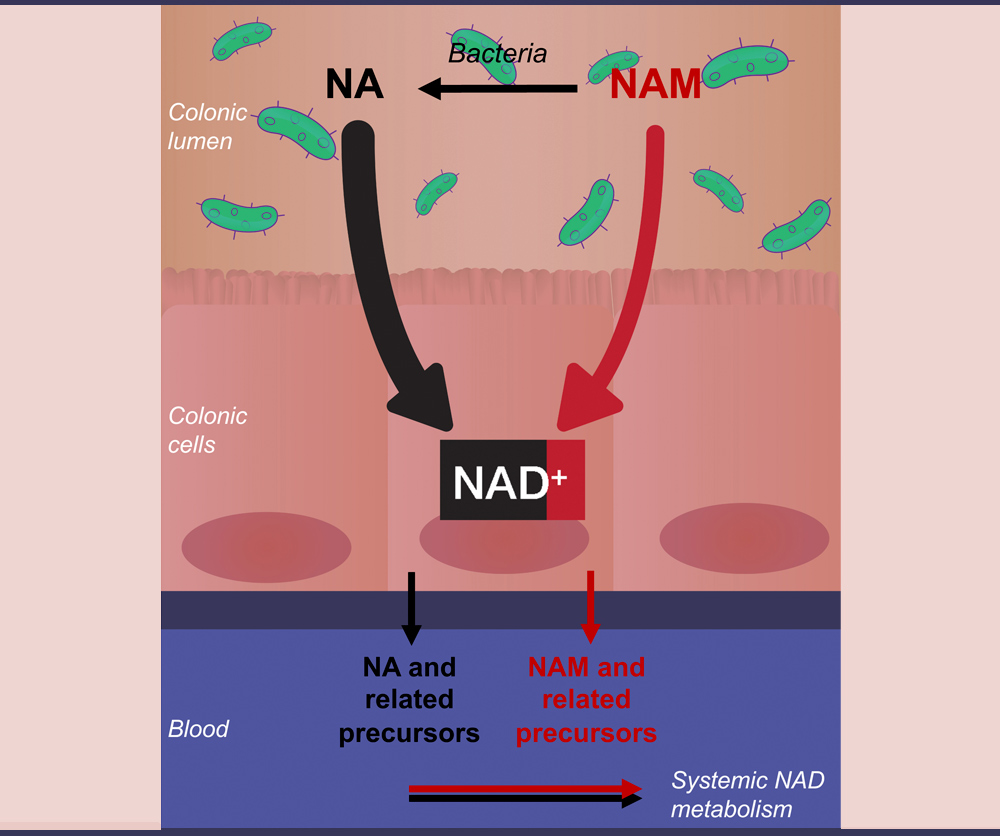 Nicotinamide (NAM) enters the amidated pathway (red) to make NAD. Gut bacteria also convert NAM into another precursor, nicotinic acid (NA), which host gut cells use to make NAD via the less common deamidated pathway (black). (Photo courtesy of Xiaoling Li)
Nicotinamide (NAM) enters the amidated pathway (red) to make NAD. Gut bacteria also convert NAM into another precursor, nicotinic acid (NA), which host gut cells use to make NAD via the less common deamidated pathway (black). (Photo courtesy of Xiaoling Li)According to Li, NAD is needed to make the molecule that cells use for energy, known as adenosine 5'-triphospate (ATP). Because tumors require a lot of ATP to grow and spread, several pharmaceutical compounds aim to kill cancers by reducing NAD synthesis.
However, Li’s group found that bacteria that live inside some tumors, such as those found in colon and pancreatic cancer, make the tumors resistant to anti-cancer drugs that target NAD. The resistance occurs because bacteria in the tumors produce PncA, which allows the tumor cells to bypass the blocked pathway and use the second, less common pathway to make NAD. Ultimately, the tumors generate the energy necessary to grow.
The importance of gut microbiota
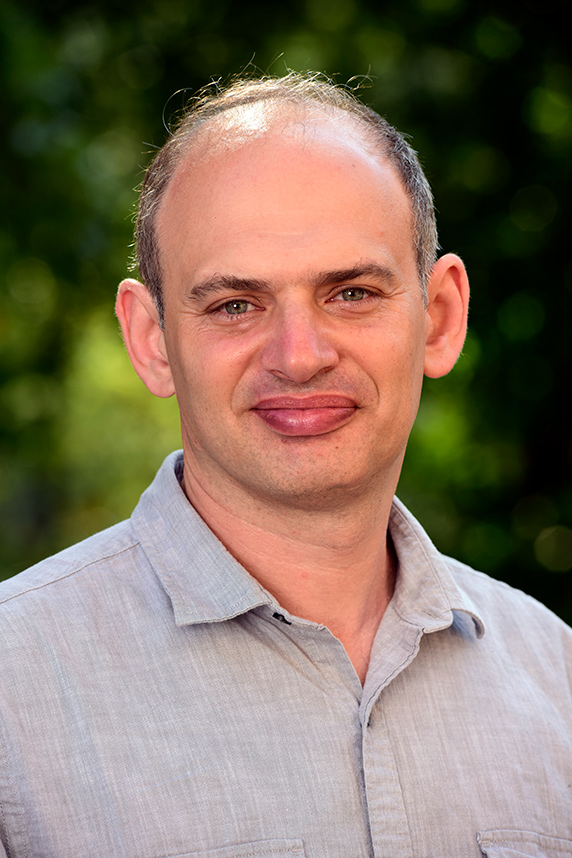 'The experts in the field were surprised to find out that the majority of NAD was actually being made through the longer deamidated pathway, because it is more efficient,' Shats said. (Photo courtesy of Steve McCaw)
'The experts in the field were surprised to find out that the majority of NAD was actually being made through the longer deamidated pathway, because it is more efficient,' Shats said. (Photo courtesy of Steve McCaw)NIEHS Staff Scientist Igor Shats, Ph.D., a member of Li’s group and lead author of the study, noted that NAD levels tend to decrease as mammals age. He said some people take supplements to boost NAD production. Shats explained that his group’s latest research indicates that the efficacy of those compounds depends on gut microbiota.
'If your gut bacteria do not have the enzyme we found responsible for [advancing] NAD synthesis, the supplements will be much less efficient,' he said.
Citation: Shats I, Williams JG, Liu J, Makarov MV, Wu X, Lih FB, Deterding LJ, Lim C, Xu X, Randall TA, Lee E, Li W, Fan W, Li J-L, Sokolsky M, Kabanov AV, Li L, Migaud ME, Locasale JW, Li X. 2020. Bacteria boost mammalian host NAD metabolism by engaging the deaminated biosynthesis pathway. Cell Metab 31(3):564-579.e7.





